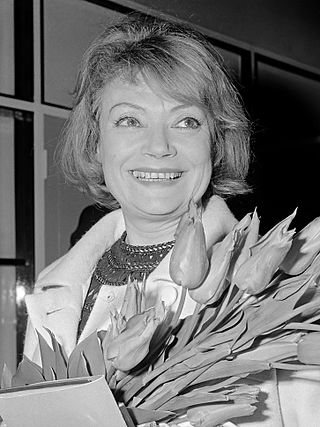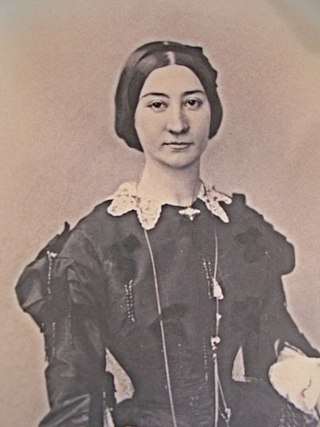The Cemetery of Montmartre is a cemetery in the 18th arrondissement of Paris, France, that dates to the early 19th century. Officially known as the Cimetière du Nord, it is the third largest necropolis in Paris, after the Père Lachaise Cemetery and the Montparnasse Cemetery.
Maria is a feminine given name. It is given in many languages influenced by Christianity.
Yezhov or Ezhov is a Russian masculine surname derived from the word yozh, meaning hedgehog; its feminine counterpart is Yezhova or Ezhova. It may refer to:

Yelizaveta Nikolaevna Kedrova, known as Lila Kedrova, was a Russian-born French actress. She won the Academy Award for Best Supporting Actress for Zorba the Greek in 1964, and the Tony Award for Best Featured Actress in a Musical for the same role in the musical stage version of the film in 1984.

Galina Pavlovna Vishnevskaya was a Russian soprano opera singer and recitalist who was named a People's Artist of the USSR in 1966. She was the wife of cellist Mstislav Rostropovich, and mother to their two daughters, Olga and Elena Rostropovich.

Praskovia Ivanovna Kovalyova-Zhemchugova also Kovaleva or Kovalyova, Kovaleva-Zhemchugova, Zhemchugova-Sheremeteva, and Sheremeteva or Sheremetyeva was a Russian serf actress and soprano opera singer.
Natasha is a name of Slavic origin. The Slavic name is the diminutive form of Natalia.

Giulia Grisi was an Italian opera singer. She performed widely in Europe, the United States and South America and was among the leading sopranos of the 19th century.

Inga Åberg was a Swedish actress and opera singer. She was engaged as an opera singer at the Royal Swedish Opera, and as a stage actress at the Royal Dramatic Theatre, between 1787 and 1810.
Ella is a personal name most often used as a feminine given name, but also as a surname, especially in Australia. In Greek mythology, Ella was the daughter of Athamas and Nephele. The name may be a cognate with Hellas, the Greek name for Greece, which is said to have originally been the name of the region around Dodona.

JulieMathilda Berwald was a Swedish concert and opera singer.
Nina is a feminine given name with various origins and alternate spellings accordingly. Nina may also serve as a short form of names ending in "-nina/-ina", such as Clementina, Christina, or Giannina. It serves as a diminutive of the variation of nevertheless original form of Hebrew name, “Johannah”, or “Joanina”.

Angiolina Bosio was an Italian operatic soprano who had a major international career from 1846 until her premature death in 1859 at the age of 29. She sang at the most important opera houses in Boston, Havana, London, Madrid, Moscow, New York, Paris, Philadelphia, Saint Petersburg, and Verona. She was particularly admired for her performances in operas by Giuseppe Verdi.

Fyodor Petrovich Komissarzhevsky was a Russian opera singer and teacher of voice and stagecraft. A leading tenor at the Mariinsky Theatre in St. Petersburg, he created many roles in Russian operas, including the Pretender in Mussorgsky's Boris Godunov and the title role in Tchaikovsky's Vakula the Smith. He had a voice described in the Grove Book of Opera Singers as small but with a "velvety timbre" and as a singer was known for not only for his clear diction and beautiful phrasing but also for his skill as an actor. He was the father of the actress Vera Komissarzhevskaya and the director Theodore Komisarjevsky.

Isabella Hill, better known as Mrs Howard Paul, was an English actress, operatic singer and actress-manager of the Victorian era, best remembered for creating the role of Lady Sangazure in the Gilbert and Sullivan comic opera The Sorcerer (1877).

Events from the year 1783 in Sweden

People's Artist of the RSFSR was an honorary title granted to Soviet Union artists, including theatre and film directors, actors, choreographers, music performers, and orchestra conductors, who had outstanding achievements in the arts, and who lived in the Russian Soviet Federative Socialist Republic (RSFSR). This title was one rank below Honored Artist of the RSFSR and one above People's Artist of the USSR.

Eulalia Pavlovna Kadmina was a Russian singer, contralto, mezzo-soprano, dramatic actress.

Hedwig Reicher-Kindermann (1853–1883) was a German opera singer whose range covered both soprano and contralto. She trained as a pianist until she was 15 when her father recognized her singing abilities. In 1871, she was engaged by the Court Theatre in Munich where she performed as a singer, dancer and actress. After singing in Bayreuth in 1876, she made guest appearances in Austria, France and Italy. In 1880, she was engaged by the Leipzig Opera where she became known for her Wagnerian roles. From September 1882, she toured widely with Angelo Neumann's Niebelungentheater but died in Trieste, Italy, on 2 June shortly after appearing as Brünnhilde in Wagner's Götterdämmerung.













